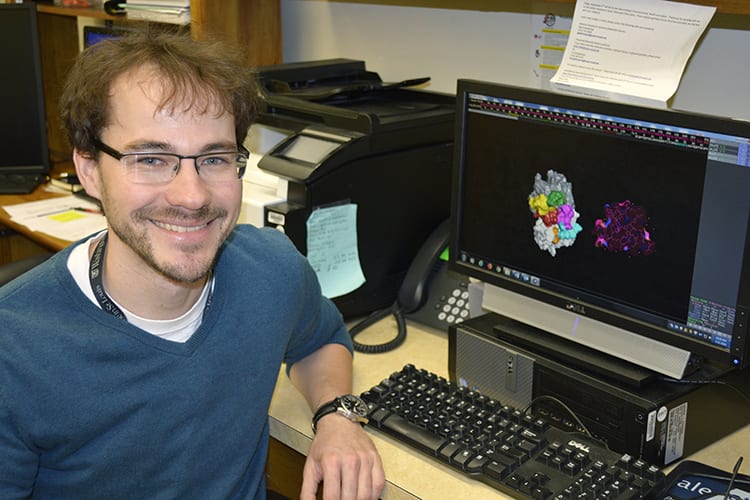
Tell me about your background.
I was born and raised in a small town in Southern Germany next to the Swabian Alpes located between the state capitals, Stuttgart and Munich, both well-known for their automobile industries and the largest beer festivals in the world. Focusing early on Antibody Engineering, I studied Technical Biology at the University in Stuttgart, including a research stay at the Plückthun Lab in Zurich (Switzerland). I received my German Diplom in 2009 (comparable with a combined Bachelor’s and Master’s degree), working on my thesis based on bispecific antibodies for cancer therapy. After moving to the romantic university town of Heidelberg (Germany), I conducted my doctoral research at the National Center for Tumor Diseases, focusing my dissertation on the generation of recombinant therapeutic antibodies from human phage display libraries. I was awarded a Doctor rerum naturalium (PhD equivalent) by the University of Stuttgart with the in 2014.
What led you to study at Washington University?
After my dissertation, I felt it was time for a completely new chapter in my life and I started applying for interesting research positions all over the States. During this time, Dr. Buck Rogers was luckily looking for an Antibody Engineer with my skillset. Everything pretty much matched perfectly: two inspiring Skype calls later, in which we discussed potential projects, we had an agreement and I joined the WashU community as a Postdoc in the beginning of 2015. In retrospect, I am very happy about my decision. The School of Medicine is one of the world’s leading research institutions, giving a great perspective for future careers. Additionally, the high diversity of leading experts with different expertise from all over the world, creating the kind of special environment needed for novel ideas and synergistic collaborations. Last but not least, I really enjoy the bidirectional and open discussions with Dr. Rogers, and the highly cooperative and professional environment within in our research group.
What are your future career goals?
I want my career to have a meaningful impact on patients’ lives by developing therapeutic antibodies and proteins. My current plan is to continue this kind of biomedical research, most likely in the Biotech industry. Having completed this postdoc training, I am convinced that I will be well prepared to contribute in this area anywhere in the world.
Tell me what are you currently working on?
According to my expertise, I am responsible for all protein related work in the Rogers Lab. Currently we are working on several projects, often as WashU-internal collaborations, as well as outside nationally and internationally. The major focus is on the generation, engineering, and preclinical development of human recombinant antibody-based compounds against a broad panel of therapeutic targets, predominantly for cancer therapy. In close collaboration with Dr. Dennis Hallahan, I created two large human antibodies libraries based on human donor material, which are a valuable source for human therapeutic antibodies. Next, we are developing new recombinant single chain Fragment variable (scFv) antibodies against various targets. For instance, we were very successful in developing a scFv targeting human CD44 for immune PET by radiolabeling with e.g. 64Cu or 89Zr using different engineered antibody formats. Besides the use of our recombinant antibodies for imaging purposes, we are also interested in the development of antibody-based therapeutics employing different strategies, from nanoparticles to antibody based fusion proteins.
What has been the most challenging aspect of this area of study?
The good thing is that recombinant antibody technology is in extremely high demand, both in academic research and the biotech industry, with sales of about 90 billion dollars worldwide in 2017. From this point of view, I am not really concerned about my future. The downside of the academic setup is the fact that we also compete with big pharma with its almost unlimited financial capabilities. As you can imagine, the lower financial resources on academia limits high-throughput screenings, elaborate preclinical developments, and downstream processing. However, one can succeed in academia by doing something big pharma is not (yet!) interested in or by innovation. Good examples are the target development currently done by academic research or smaller biotech companies. Another example here is the whole imaging field. Although highly beneficial for patients, the development of antibody-based radiopharmaceutical for immunoPET is currently a bit out of scope of big pharma.
What are your future plans for this subject/study?
In addition to contributing to the scientific community by publishing our research, the focus is to develop preclinical antibodies for clinical translation either in collaboration with industrial partners or a rendition of sort. Another potential idea is to use the newly generated antibodies libraries as Department-internal core facilities for the development of recombinant antibodies and/or proteins, including production and purification.
Philipp Diebolder is a member of the Rogers Lab.